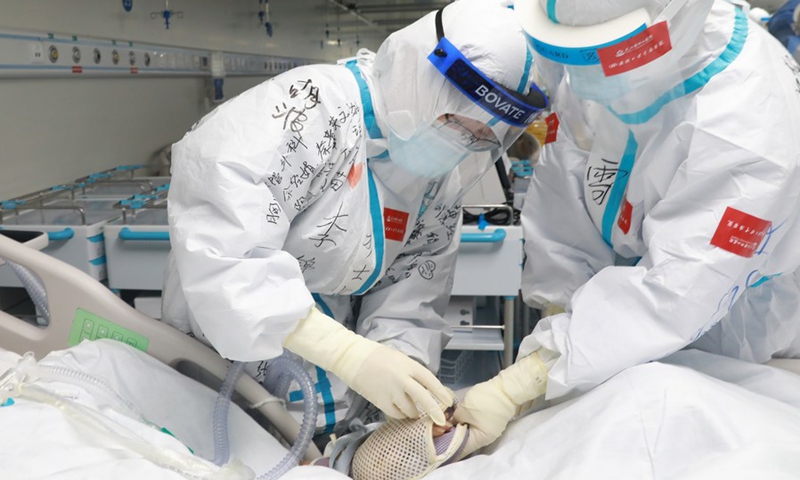
Medical staff nurse a COVID-19 patient in Wuhan, central China's Hubei Province, April 14, 2020. Photo: Xinhua
Wuhan, in Central China's Hubei Province, a region once hit hard by the COVID-19 pandemic has recovered its dynamism. The city is summarizing lessons learned from the anti-epidemic work and improving its response system for public emergencies. It has vowed to release information regarding emergencies within five hours and reserve 20,000 hospital beds for infectious diseases.
The city government on Monday reviewed the draft of the Overall Emergency Plan of Wuhan. The draft plan said authorities should release information within five hours and hold press conferences after a major emergency occurs.
The draft plan is divided into four categories, which include natural disasters, accidents, public health emergencies and social security events, serving to refine the responsibilities of relevant departments. Also, the plan requests local authorities to conduct emergency drills at least once every three years.
According to the draft plan, ordinary emergencies should be handled by governments of local districts, while major and special emergencies should be handled by the city government.
An official from the Justice Bureau of Wuhan said the current Overall Emergency Plan of Wuhan was formulated in 2013, and some of the contents no longer meet the needs of emergency management in the current era.
The official noted that in response to the COVID-19 outbreak and other emergencies, Wuhan has not only accumulated a large amount of solid experience and practices, but also exposed shortcomings and problems, so it's necessary to sum up the experience and lessons learned to improve the plan.
The draft plan emphasizes the principle of "life first" and being "people centered," addressing the top priority of protecting public health, life, property safety, minimizing casualties and hazards. It requests the relevant authorities and units to take precautions to solve problems before they become a disaster.
Also, during the 14th Five-Year Plan (2021-25), Wuhan plans to improve the treatment system for major epidemics, focusing on the prevention and control of an epidemic, and build a hierarchical and decentralized treatment network for urban infectious diseases.
According to the city's plan, it will reserve 20,000 hospital beds for infectious diseases and medical equipment such as cardiopulmonary resuscitators, ventilators and extracorporeal membrane oxygenation (ECMO) according to different scales and functions. Also, the city will reserve medical and protective supplies, and equip negative pressure ambulances, mobile CTs, mobile DRs, mobile P3 laboratories and other related equipment.
To improve the ability to detect infectious diseases, all secondary and above medical institutions in Wuhan have been equipped with polymerase chain reaction (PCR) laboratories for nucleic acid testing. In the next five years, it plans to build several urban testing bases and national public testing platforms with a daily single testing volume of 10,000, so as to enhance cross-regional support capacity.
Medical institutions will build P3 and pathogen detection laboratories for emergency infectious diseases.
In addition, Wuhan has also set up four teams of 1,000 people for epidemiological surveys, disinfection, detection and control. It has carried out emergency drills in areas such as the community, supermarkets, providing training to 12,000 people.
Wuhan will build a 10-minute first-aid circle in its central urban area and a 12-minute first-aid circle in the new urban area, and actively promote the construction of 10 regional first-aid sub-centers.
By 2022, a first-class Wuhan-centered public health emergency management system will be established; by 2025, the city will have built a public emergency and medical rescue center as a modern international metropolis and capable of participating in international affairs.




